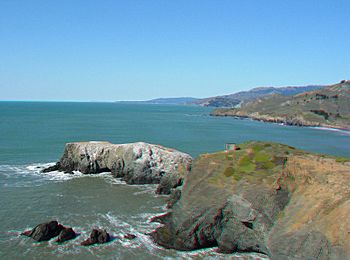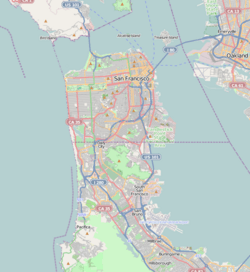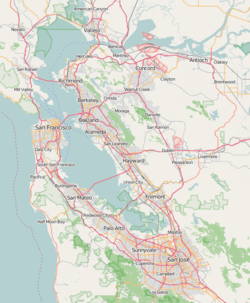Bird Island (Marin County, California) facts for kids

Anaglyphic photograph of Bird Island
|
|
| Geography | |
|---|---|
| Location | Northern California |
| Coordinates | 37°49′27″N 122°32′12″W / 37.82417°N 122.53667°W |
| Adjacent bodies of water | San Francisco Bay |
| Administration | |
| State | |
| County | Marin |
Bird Island is a small island located in Northern California. It sits between Point Bonita and Rodeo Cove in southern Marin County, California. This tiny island is found off the coast of the Marin Headlands, which is about three miles from the city of San Francisco.
Contents
Discovering Bird Island
Bird Island might be small, but it's an interesting part of the San Francisco Bay area. It's not a place where people live or visit easily. Instead, it's a natural spot that plays a role in the local environment.
Where is Bird Island Located?
This little island is part of Marin County, which is just north of San Francisco. It's found in the waters of the Pacific Ocean, very close to the entrance of the San Francisco Bay. Imagine standing on the coast near the famous Golden Gate Bridge; Bird Island is not far from there. Its exact location is at 37°49′27″N 122°32′12″W.
What Makes Bird Island Special?
Even though it's small, Bird Island is important for a few reasons. It's an uninhabited island, meaning no humans live there. This allows nature to thrive without much disturbance. The island is mostly made of rocks and is exposed to the ocean waves.
Wildlife on Bird Island
As its name suggests, Bird Island is a place where birds can be found. Islands like this often provide safe resting and nesting spots for various types of seabirds. They can be a refuge from predators found on the mainland. While specific bird species aren't listed, it's common for islands in this region to host birds like gulls, cormorants, and other coastal birds. These birds use the island for breeding and raising their young.
Protecting Natural Islands
Small, uninhabited islands like Bird Island are important for the environment. They help protect wildlife and keep natural habitats safe. Because they are not easily accessed by people, they remain wild and untouched. This helps preserve the delicate balance of nature in the San Francisco Bay area.
 | Janet Taylor Pickett |
 | Synthia Saint James |
 | Howardena Pindell |
 | Faith Ringgold |





